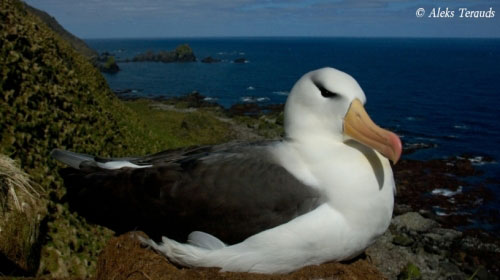This austral summer researchers have added GPS loggers to five globally Near Threatened Black-browed Albatrosses Thalassarche melanophris on Australia’s Macquarie Island. The study is being led by marine ornithologist Rachael Alderman of the Tasmanian Department Primary Industries, Parks, Water and the Environment (DPIPWE) Marine Conservation Branch.
“In the last month field biologists, Kim Kliska and Penny Pascoe, have successfully taped the miniature devices to the feathers on the back of albatross and the data is [sic] then beamed back while they forage.”
Four of the five loggers have been retrieved so far from the only 50 pairs of Black-browed Albatrosses that breed on Macquarie. Read more here.

Black-browed Albatross, photograph by Aleks Terauds
“All the data collected is [sic] fed into the International Agreement on the Conservation of Albatross and Petrels to inform conservation measures such as reducing seabird by-catch in fisheries. Australian sub-Antarctic fisheries are closed during summer, to avoid albatross when they are foraging close to shore to feed their chicks. The black browed albatross population on Macquarie Island has benefited from the eradication of rabbits, with regrowth of vegetation providing critical nesting habitat and better protection from extreme weather and predators.”
Over winter, satellite tags were used to track ACAP-listed Grey Petrels Procellaria cinerea breeding on Macquarie (click here).
John Cooper, ACAP Information Officer, 26 January 2017

 English
English  Français
Français  Español
Español